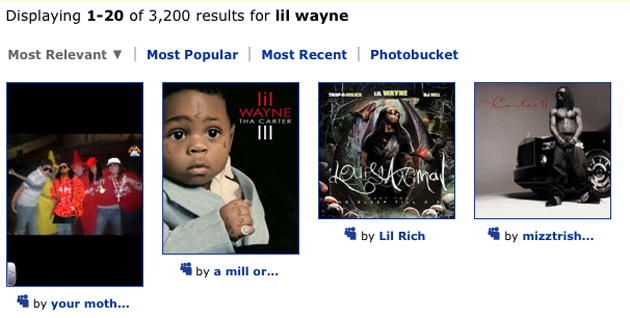MySpace has introduced a new image search feature to its integrated search engine, allowing users to quickly search through photos shared by their friends and the MySpace community. While MySpace did not officially announce the new feature, the company has confirmed that it recently went live, and indexes around 3 billion of the site’s 7 billion photos. The addition reflects MySpace’s apparently increasing focus on its search engine, which also includes the site’s video and music content along with a Google-powered web search.
Users are given the option to search through photos their friends have shared, those with viewing rights set to ‘public’ by other MySpace users, or images on Photobucket, which was acquired by MySpace’s parent company in 2007. MySpace says that all results are shown through a “social lense”, which means that the engine pays attention to keywords in your profile and who your friends are to try to generate the most relevant results.
It’s a neat feature and one that I’m sure will improve over time, but in its current form MySpace Image Search is a little weird. While a search for “San Francisco” on Flickr or Google Image Search will generally yield city-scapes or famous landmarks, most of the results on MySpace feature people that you don’t know, with the famous landmarks in the background. Searches for celebrities like ‘Lil Wayne‘ tend to fare better, but you’ll still wind up with a number of MySpace users who have photographed themselves dressed up as the person you searched for. Like I said, it’s a little weird – though it can come in handy when you’re only concerned with looking through your friends’ photos.

Much of the problem stems from the fact that Image Search relies on each photo’s meta-information, which includes tags and captions (about 4 billion of MySpace images don’t have any of this information, so they aren’t included in the index). Unfortunately, many of the photos on the social network are either poorly tagged or feature captions that are not particularly descriptive, which can lead to mixed results. MySpace wouldn’t comment on its future plans to improve the technology, but I suspect they’re working on some kind of image recognition engine that can provide more relevant results.
We should note that Facebook has an image catalog of well over 10 billion photos (trumping MySpace’s by a significant margin), but the site’s setup with segmented networks and granular privacy settings probably isn’t conducive to a site-wide search.
